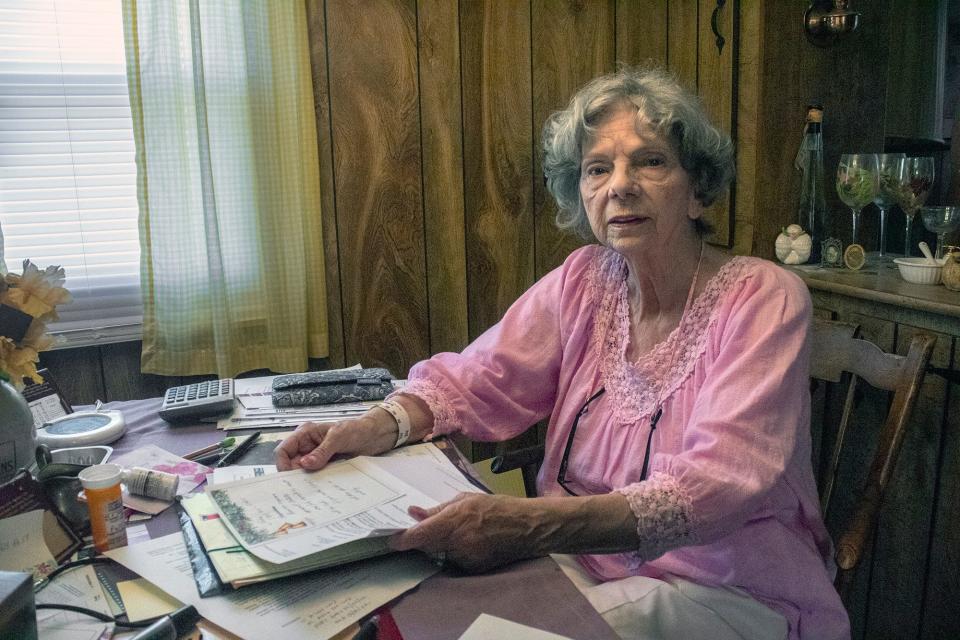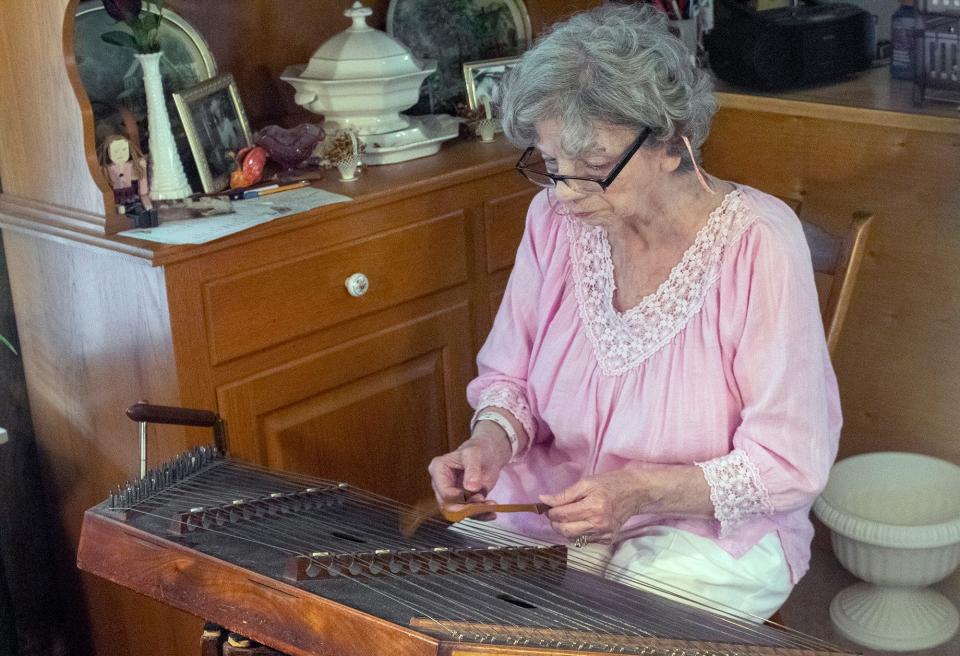Pennsylvania woman stunned to be charged $50K for asthma medication. No one can explain it
YORK, Pa. — Jessica Eckard has always had asthma problems.
Her father died of tuberculosis when she was young, she had struggled with breathing during gym class and was even told by her swim instructor to "never get your head under water."
She had spent some time smoking in adulthood but had quit in the 1970s. Regardless, damage and scarring in her lungs had driven her to see a pulmonary specialist in her golden years.
A widow living in a Stewartstown, Pennsylvania, mobile home park with a pension and a rescued Shi-Tzu, Eckard did not have much extra cash to spend on medical treatments, but her severe breathing problems, along with urging from friends, drove her to find a specialist at WellSpan.
"I was going to just my regular doctor when I'd have a flare-up, and they'd put me on steroids, and I'd fly around the room for that 10-day course," Eckard said. "I'm good until the next flare-up. So then a friend of mine said, 'Why aren't you seeing a specialist, for heaven's sake?'"
From there, she was diagnosed with eosinophilia asthma, a type of lung disease marked by frequent asthma attacks and gradually depleting lung function.
She said her pulmonary and sleep medicine doctor at York Hospital recommended she take a new drug called Fasenra. It's an injection designed to prevent asthma attacks, improve breathing and lower the need for oral steroid use.
It is an eight-injection regimen, one every eight weeks, where Eckard would go to the Apple Hill Infusion Center and receive her medication.

She said she asked for an explanation of benefits multiple times to understand how much she would be paying for the medication, but she never got the full statement before her first dose.
Shortly after receiving her second dose of Fasenra, Eckard got her bill from the hospital.
She and her insurance were being charged more than $25,000 per dose. And she had another bill for the second dose on the way.
An ominous sign for consumers: More inflation is on the way, and your health care bills are set to rise. Here's why.
'Food as medicine': White House pilot program would bring medically tailored meals under Medicare
The blame game
Eckard distinctly remembers walking into her home, opening the billing statement, and sinking into the couch, confused as to why she and her insurance were being saddled with such a hefty bill.
She began making calls, "hollering" on the phone, trying to find someone to explain what she was being charged for.
She was stuck with a $796.53 copay for the first shot, with her insurance taking the brunt of the expense in what was listed as a "write off."
She said that between York Hospital, Aetna and Fasenra's producer AstraZeneca, they all pointed fingers at each other.
WellSpan said the charges were determined by the pharmaceutical company and coverage by the insurance company, while AstraZeneca said the pharmacy would determine the final charge. The Apple Hill pharmacy is owned by WellSpan.
Aetna, Eckard's insurance company that provides her Medicare, said the pharmacy and care provider determine the cost, and Aetna deals with it from there.
"We strive to be transparent about costs for treatments, services and fees so that our patients are well informed about their health care. In each case, reimbursement, coinsurance and the final out-of-pocket cost to patients are determined by the specific health insurance plan and drug coverage a patient is enrolled in," WellSpan spokesman Ryan Coyle wrote in a statement.
"WellSpan does not have input on how Medicare calculates reimbursement and coinsurance; nor does it have input on the cost of medicines, which are established by Medicare and the pharmaceutical companies."

AstraZeneca focused its response on the drug company's payment assistance programs, which can provide the drugs at a steep discount, or even free.
"AstraZeneca is committed to providing assistance to patients whom can’t afford FASENRA and has a number of programs in place to assist patients in paying as little as $0.00 for the medicine. The list price for FASENRA is $5,350.88 per 30 mg/mL," an AstraZeneca spokesperson wrote in a statement.
"However, this price is rarely the cost to an individual patient as it will vary dependent on a series of factors outside of AstraZeneca’s control, including an individual’s health insurance coverage, formulary placement, provider access and provider administration costs. We encourage patients to request a full breakdown of costs from their provider and insurance company."
No one could explain why the bills were for $25,000 for a drug that lists for $5,350.
Regardless, Eckard and her insurance were stuck holding the bill.
'Absolutely baloney'
Patrick Keenan, director of policy and partnerships at the Pennsylvania Health Access Network, a nonprofit focused on pricing and accessibility of the health care system in the state, weighed in on Eckard's situation.
"We've seen an explosion of prices, really over the past decade, with a lot of these blockbuster drugs that the price just seems to go up and up and up," Keenan said.
Eckard had said that before her experience she used to stick up for drug pricing, as she was told the companies underwent significant risk in the research and development of new drugs. Now she feels differently.
And so does Keenan.
"That's absolutely baloney," Keenan said. "American taxpayers have already paid for that."
He said that while there is some risk to the companies developing new drugs, many pharmaceutical companies are receiving government grants and funding to conduct that in the first place, which is funded by taxpayers, who then assume the cost of the new drug as it is released.
Medicare Part D: Where you live can have a big impact on what you pay for drugs
Pharmaceutical companies often buy the rights to the research and then put the drug on the market.
Eckard also expressed her concern that drugs such as Fasenra were frequently being marketed on television, making her doubt her payment for the drugs was actually supporting research and making the medication available.
She said many of the commercials on her television are advertising a drug with a myriad of possible side effects.
Keenan agrees, saying most major pharmaceutical companies spend more on advertising than research and development.
He also spoke about how companies will offer coupons and payment discounts and plans, but he said the actual reform needed is fair drug pricing.
According to Keenan, the model is currently set up that people with bigger pocketbooks can access high-profile drugs. This ultimately results in huge profits for the company. But they create coupon programs that will introduce the drug to those who can't afford it, whether for a limited trial or for the full treatment, which reflects well on the company.
He said the companies are making a huge profit on the drugs in the first place, and they can still make similar profits if they priced their product at what he considers a more fair cost.
"I mean, we're not asking drug manufacturers to go bankrupt, or to become charities and sell their drugs at no money," Keenan said. "What we're asking for is fairness in the drug pricing system."
Aetna was able to take a large chunk of Eckard's bill off as a "write off" because the provider essentially hit the ceiling with how much they are allowed to pay. The company still paid over $3,000 for one shot.
Medicare has not been able to legally negotiate the drug charges in the past. The recently passed Inflation Reduction Act will likely change the standard in the coming months as it allows Medicare to negotiate charges on select drugs.
The squeaky wheel
After petitioning for months and trying to get attention to her story, representatives from her insurance provider and WellSpan eventually got her on a senior payment program. Eckard said it felt like a weight off her chest.
"I found out more than ever that the squeaky wheel gets the grease," Eckard said.
Now, instead of staring down the barrel of an $800 copay per shot, Eckard is looking at $28 to cover the remainder of her initial consultations, and the rest of her Fasenra injections will be free.
Jack Panyard on Twitter @JackPanyard.
This article originally appeared on York Daily Record: Woman surprised by $50,000 medical bill for asthma medication

